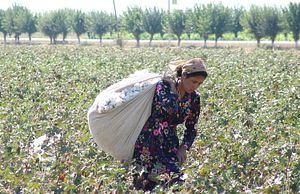In 2014, a teacher in Andijan paid a replacement worker to pick cotton in her name. She paid 10,000 soum per day. But when the 2015 harvest came around in the fall she went to the field – the price of a replacement had gone up to between 15,000 and 25,000 soum per day, plus another 100,000 soum for 10 days worth of food.
“And it’s hard to find [replacement workers]. It’s the only way to get out of picking cotton unless you have close relationships with the authorities,” she told a monitor from the Uzbek-German Forum for Human Rights in November 2015.
Cotton is often referred to as Uzbekistan’s “white gold” because it is an immensely profitable industry for the country. The Uzbek authorities have been criticized for decades by human and labor rights groups for child and forced labor. The dramatic decline in child labor since 2012 belies the fact that forced labor systems remain entrenched in Uzbekistan. And because of the Uzbek government’s near complete opacity, especially regarding revenues from cotton, it’s difficult to definitively determine who is really benefiting from this massive industry – but it’s certainly not the farmers or workers.

































